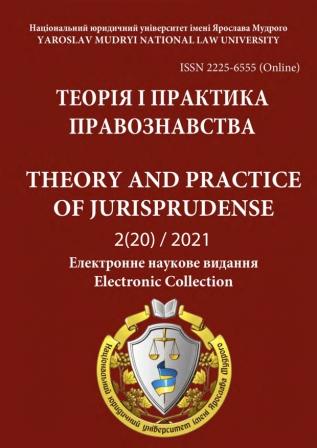Розуміння явища злочинності: від догматичних поглядів до наукових теорій
Understanding phenomena of criminality: from dogmatic views to scientific theories
Author(s): O. V. FedorovSubject(s): Anthropology, Criminal Law, Criminology, Social Norms / Social Control
Published by: Національний юридичний університет імені Ярослава Мудрого
Keywords: criminality; theory of criminality; factors of criminality;
Summary/Abstract: Criminality accompanies humanity for millennia. Despite the fact that this phenomenon has received much attention from researchers of different times and countries, its joint understanding is still missing. Taking into account the previous experience of cognition of this phenomenon, of course, should be the key to effective preventive action in current conditions. The purpose of the paper is to explore the main approaches in understanding criminality from prehistoric times to the present. It is claimed that historically the first awareness of mankind of socially dangerous behavior occurred during the reign of the primary tribal communities. People’s knowledge of the world around them was minimal at that time, and explanation of incomprehensible and undesirable was based only on the authority of tribal leaders and respect for social traditions. Given the actual lack of scientific and methodological basis as such, this format of views on violations of social norms can be described as a dogmatic approach. Religions have in their arsenal views on unacceptable behavior based on the authority of the Creator. At the same time, in the theological approach there is a variety of interpretations of the causes and essence of forbidden behavior – from purely fatalistic views to the recognition of human free will in the commission of encroachments. Examples in this regard are the Laws of Manu, the Old Testament. Genesis”, Books by J. Sprenger and G. Institoris “The Hammer of Witches”, “The Sum of Theology” by Thomas Aquinas,“Confession” by Augustine Aurelius and others. The scientific approach is characterized by the use of scientific methods of cognition in substantiating theories of criminality. The variety of views here includes theories of social causes, anthropological theories, theories of multiplicity of factors, and others. According to the anthropological direction, the essence of criminality was associated with the manifestation of biological (anthropological) properties of a human (genetic features, endocrine system, mental state, etc.). Sociological direction asserts the influence of social factors as factors in the formation of criminality (internal contradictions, class conflict, social exclusion, stigmatization, etc.). In this regard, there are theories that, along with the circumstances of social content as factors of crime outline also biological (anthropological). It is concluded that in the future understanding of the phenomenon of crime should take place on the basis of a scientific approach.
Journal: Теорія і практика правознавства
- Issue Year: 2/2021
- Issue No: 20
- Page Range: 225-239
- Page Count: 15
- Language: Ukrainian

